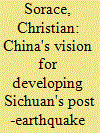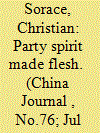| Srl | Item |
| 1 |
ID:
132953


|
|
|
|
|
| Publication |
2014.
|
| Summary/Abstract |
In the aftermath of the 2008 Wenchuan earthquake, government officials, scholars and outside observers eagerly hoped that the emergency relief and reconstruction process would bring about the emergence of civil society and increase grassroots democratic participation. Contrary to this optimistic assessment, this article contends that the local state used the opportunity of the disaster as an experimental laboratory to implement an array of already existing national development plans. The urgency with which the reconstruction was to be completed and the opportunities to meet national development targets as well as access reconstruction funds were too tempting to resist. However, the ham-fisted Leninist implementation style met with local resistance and has contributed to a significant deterioration in local state-society relations. The fact that many local residents continue to question why, despite the huge resources invested by the state in the reconstruction project, they have yet to see any improvement in their economic and overall living conditions points to a deficit of local participation and a breakdown in political communication and trust. By focusing on the different political economies of disaster reconstruction, this article attempts to illuminate the regime's vision for developing the countryside, rural politics, and state-society relations in China more broadly. Unless the state is able to incorporate local needs into its development plans, it will not win the trust and support of local residents, regardless of the amount of money it invests or the benevolence of its intentions.
|
|
|
|
|
|
|
|
|
|
|
|
|
|
|
|
| 2 |
ID:
181924


|
|
|
|
|
| Summary/Abstract |
In its one hundred years of existence, the Communist Party of China has experimented with how to connect its narratives of legitimacy to people's affects. In this essay, I trace the conceptualization of gratitude, from its repudiation in the Mao era as a vestige of feudalism and imperialism to its return in the reform era as a re-verticalization of Party sovereignty. The paper addresses four examples of gratitude work: Politburo Standing Committee member Wang Yang's short-lived critique of gratitude in the name of a different conception of popular sovereignty; the celebration of the tenth anniversary of the Sichuan earthquake as a day of gratitude; the detention of Uyghurs in Xinjiang who are taught to be grateful to the Communist Party in a campaign of religious de-radicalization; and the refusal of gratitude in quarantined Wuhan during the COVID-19 pandemic. In these cases, the Communist Party's sovereignty stands at the threshold between bio- and necro-politics, promising life and salvation in the midst of death and destruction.
|
|
|
|
|
|
|
|
|
|
|
|
|
|
|
|
| 3 |
ID:
145796


|
|
|
|
|
| Summary/Abstract |
This article argues that the Party retains a tradition of seeking to revitalize its legitimacy through demonstrations of benevolence and glory. The post-2008 Sichuan earthquake provided just such an opportunity to mobilize the discourse of “Party spirit” and display the willingness of cadres to suffer and sacrifice themselves on behalf of the people. In addition to being grist for the propaganda mill, these norms and expectations were implemented in concrete policy directives and work pressures. Local cadres, who were also earthquake survivors, started to suffer from exhaustion, insomnia, and depression. After high-profile suicides by several local cadres, the Party adopted a therapeutic discourse in order to address the psychological needs of individual cadres, though these gentler policies seem doomed to be short-lived.
|
|
|
|
|
|
|
|
|
|
|
|
|
|
|
|